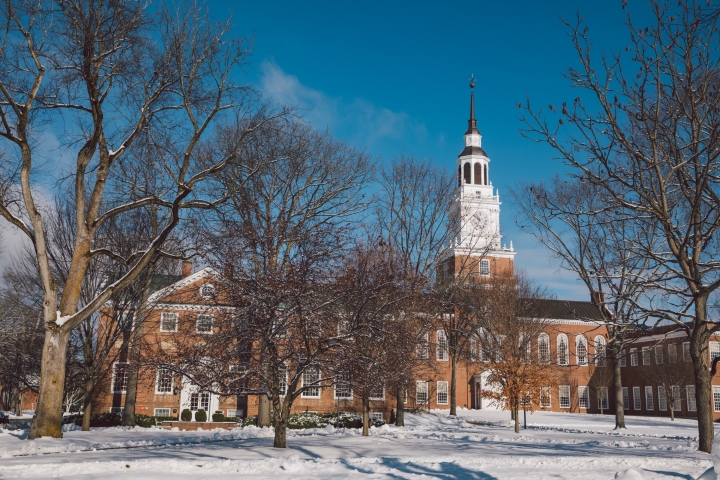As Dartmouth prepares to offer early admission to the first members of the Class of 2026, the institution has made significant progress in its commitment to strengthen financial aid, the foundation of its goal to provide educational opportunity for all accepted undergraduates.
To date, more than $326 million in new endowed scholarship funds have been generated from alumni, parents, and friends as part of The Call to Lead campaign, which this past fall topped $3 billion.
The endowed funds raised represent nearly two-thirds of the $500 million Call to Lead goal for scholarship aid, of which $450 million is targeted toward undergraduates—and includes $61 million given for scholarship endowments in the current fiscal year.
“Making Dartmouth affordable to the most talented students around the world is our top priority in the Call to Lead,” says President Philip J. Hanlon ’77. “We believe that leadership in higher education embraces the responsibility to ensure that current and future generations of exceptional students from every background have full access to the extraordinary opportunity a Dartmouth education represents. Education transforms lives, opens economic opportunity, and fosters the bedrock values of a great society.”
“When we reach our $500 million campaign goal, Dartmouth will have achieved the largest, most intense rally for scholarship resources in the history of the institution,” President Hanlon says.
Expanding Access to the Dartmouth Experience
These investments, as well as record endowment returns, have allowed Dartmouth to announce new financial aid initiatives during the campaign, including:
- Full-tuition scholarships—without loans—for students whose families earn $125,000 or less, beginning with the undergraduate Class of 2026.
- The elimination of parental contributions for families making $65,000 a year or less; 34% of enrolled undergraduates receiving scholarship aid qualified for this policy, which took effect this fall for all undergraduates receiving aid.
- Scholarship support for all financial aid students participating in off-campus programs, in the U.S. and abroad, thanks to a lead gift from Karen and Jim Frank ’65 totaling $10.5 million, which inspired an additional $4.5 million in commitments from other alumni and parents.
- Alumni and parents have established more than 400 endowed scholarship funds through the campaign to date that will support students in perpetuity.
- These endowed scholarships include a number of historic gifts, including a gift of $10 million to establish 10 undergraduate scholarships in honor of trailblazing women, Black, and Native American alumni; a commitment of $20 million for the Jack Byrne Scholars program to support the most talented math students; and the $35 million King Scholars program, which provides scholarships for exceptional students from developing countries
Dartmouth’s undergraduate scholarship opportunities provide exceptional resources at a level offered by fewer than 30 institutions of higher education in the country. The combination of these measures achieved under Hanlon’s leadership places Dartmouth in the most competitive group of fewer than 10 U.S. universities and colleges in the global competition for talented students.
A Strategy to Meet the Challenge
“Financial aid is an investment in people,” says Lee Coffin, vice provost for enrollment and dean of admissions and financial aid. “These new aid initiatives expand access to Dartmouth for a wider range of families, they make Dartmouth more affordable, and they also allow more scholarship recipients to have full and equal access to all aspects of the Dartmouth experience.”
“Our ability to reduce the financial burden on students and families is a question of equity and fairness—and guaranteeing this support is critical for Dartmouth to remain a competitive option for the best and brightest from every socioeconomic background, but especially low- and middle-income families,” Coffin adds.
To meet the challenge, last year Hanlon convened the Presidential Commission on Financial Aid to study the issue and recommend strategies for preserving Dartmouth’s need-blind and full-need admissions policies and strengthening Dartmouth’s financial aid program overall.
The commission presented its first annual report to the Board of Trustees in November. Among their top recommendations: eliminating all loans from financial aid packages, regardless of household income, and extending need-blind admission to international students, who on average require larger financial aid packages than domestic students. Dartmouth would be the sixth U.S. institution to extend its need-blind program to all students regardless of citizenship.
“Dartmouth offers a global curriculum and has a long-standing reputation for excellence in foreign language study,” Coffin says. “Adopting universal need blind practices will put an exclamation point on the College’s commitment to global leadership.”
Learn more about supporting financial aid through The Call to Lead campaign.


